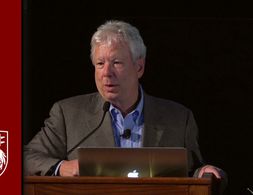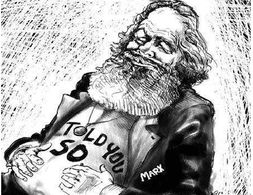✕
434 results
This text summarizes the content of the 2018 Nobel Prize winner W. Nordhaus. It is extended by some critical perspectives on this topic. The short dossier gives an overview of the most important texts we have read in the climate economics reading group.
In this one-on-one interview, co-host Gerardo Serra talks with Felwine Sarr, author of Afrotopia (2016) and professor of economics at Gaston Berger University in Senegal. Topics include the relevance (or lack thereof) of development economics to conditions in African economies, the significance of African philosophy for thinking about the economic problems of the continent, and the status of the field of history of economic thought in Africa.
This short video visualizes the destabilizing effects financial markets can have on food prices, based on a paper by Jayati Ghosh. It introduces and explains the idea of future contracts and how those are used to speculate with basic food stuffs. After establishing the concepts, the video sketches out how the increase in those practices resulted in a substantial rise and later collapse of food prices around 2008 with severe consequences for many developing countries and their people.
Richard Thaler gives a lecture in the 2018 Nora and Edward Ryerson Lecture at the University of Chicago. In the lecture he discusses his Nobel Prize winning research.
This article briefly examines Marx s profound contribution in the political economic thought It provides the historical foundations of Marxian economic thought based on the contemporary situation as well as the state of economic thought at that time Lastly it discusses the volumes of Marx s contribution as well as …
After completing the workshop in Post Keynesian Economics participants should be able to describe the main differences and similarities between PKE and other schools of thought.
Sporting events can be seen as controlled, real-world, miniature laboratory environments, approaching the idea of “holding other things equal” when exploring the implications of decisions, incentives, and constraints in a competitive setting (Goff and Tollison 1990, Torgler 2009). Thus, a growing number of studies have used sports data to study decision-making questions that have guided behavioral economics literature.
The goal of this course is to explore these differences in economic outcomes observed among women and men, measured by such things as earnings, income, hours of work, poverty, and the allocation of resources within the household. It will evaluate women’s perspectives and experiences in the United States and around the world, emphasizing feminist economics.
"Yuliya Yurchenko is a senior lecturer and researcher in political economy at University of Greenwich. She is currently in Ukraine on an extraordinary leave. And while she writes that she is, for the moment, in relative safety, that could change any moment. Being a Ukrainian, an activist and an academic, Yuliya traveled to Ukraine on Feb 19, 2022 as part of a fact-finding and solidarity mission with a number of MPs, trade unionists and journalists. The goal, she says, of this mission is to connect with civil society organizations, trade unions, activists and politicians, and “to express direct, cross-border solidarity from the UK working class to the Ukrainian working class.”
Neoliberalism is dead. Again. After the election of Trump and the victory of Brexit in 2016, many diagnosed the demise of the ideology of Margaret Thatcher, Ronald Reagan, Augusto Pinochet, and the WTO. Yet the philosophy of the free market and the strong state has an uncanny capacity to survive and even thrive in crisis.
In his 2010 published book “The Enigma of Capital and the Crises of Capitalism” multi-talented US geographer, anthropologist and Marxist economist David Harvey aims to analyse the capitalist system that has shaped western society and the globalized world of today.
The 2007-2008 financial crisis exposed the shortcomings of mainstream economic theory with economists unprepared to deal with it. In the face of this, a major rethinking of economics seems necessary and in presenting alternative approaches to economic theory, this book contributes to the rebuilding of the discipline.
Debunking Economics - Revised and Expanded Edition exposes what many non-economists may have suspected and a minority of economists have long known: that economic theory is not only unpalatable, but also plain wrong. When the original Debunking Economics was published back in 2001, the market economy seemed invincible, and conventional "neoclassical" economic theory basked in the limelight.
This thoroughly revised and updated second edition provides a comprehensive guide to Post Keynesian methodology, theory and policy prescriptions. The Companion reflects the challenges posed by the global financial crisis that began in 2008 and by the consolidation of the New Neoclassical Synthesis in macroeconomic theory.
By focusing on the human side as well as the intellectual dimensions of how economists work and think, this collection of interviews with top economists of the 20th century becomes a startling and lively introduction to the modern world of macroeconomics.
The age of the contemplative economist-scholar—at home equally in classical languages, economic history, the history of ideas, and mathematical theory—has passed. The history of economics as a subdiscipline has lost touch with the mainstream study of economics. InThe Future of the History of Economics, internationally known scholars from ten countries provide a comparative assessment of the subdiscipline.
Despite the Doha declaration of November 2001, the failure to start a new round of global trade negotiations at Seattle in December 1999 and the hostility of protesters to the trade liberalization process and growing global economic and social disparities was a wake-up call for the World Trade Organisation (WTO).
The book deals with the financial instability hypothesis of Hyman P. Minsky and its application to current developments. The first part of the work summarizes the hypothesis and mentions works elaborating the hypothesis. The second part applies the hypothesis to the financial crisis 0f 2008/09.
When Santa Fe Institute Scientists first started working on economics more than thirty years ago, many of their insights, approaches, and tools were considered beyond heterodox. These once-disparaged approaches included network economics, agents of limited rationality, and institutional evolution—all topics that are now increasingly considered mainstream.
This edited volume put together by Jimi Adesina based on the proceedings of the Social Policy in African Conference in 2017 provides an overview of social policy in varied country contexts and fields especially in light of decades of the reduction in size and hollowing out of the content of …
The Currency of Politics explains why only through greater awareness of the historical limits of monetary politics can we begin to articulate more democratic conceptions of money.
The idea of a Green New Deal was launched into popular consciousness by US Congressperson Alexandria Ocasio-Cortez in 2018. Evocative of the far-reaching ambitions of its namesake, it has become a watchword in the current era of global climate crisis. But its new ubiquity brings ambiguity: what - and for whom - is the Green New Deal?
The 2007-2010 economic crisis has profoundly shaken the foundations of mainstream financial economics. The apparent falsification of core concepts such as risk diversification, informational efficiency and valuation efficiency by an unexpected course of events has revealed the need to redefine the objectives and direction of research today.
Alvin Roth and Lloyd Shapely won the Nobel Memorial Prize in Economic Sciences for their work on market design back in 2012, but it is a field that is still underrepresented in economics education. All markets have rules, and how these rules are set influence how the market functions.
Croatia adopted the euro as its currency on 1 January 2023, becoming the 20th member state of the eurozone. In this teaching pack, students learn what it entails to join the eurozone and discuss what its effects might be. In this way, the case helps students connect theoretical insights about monetary unions with real world knowledge and economic developments in the news.
Throughout 2022 it has become increasingly difficult for people around the world to meet their basic needs – even those who live in relative affluence in the Global North. This 30-minute classroom exercise takes this common recent experience as a starting point for an exploration of the different economic mechanisms and organisations that can be used to provide for people’s basic needs.
The 2022 FIFA World Cup (including the construction work required for it) provides a clear example of economic activity that has taken place despite the financial costs to the Qatari state being an order of magnitude larger than the financial benefits it will receive. Whilst this is a fairly extreme case in terms of how many different costs and benefits are involved and how unequally they have been spread, many economic decisions are more complicated than mere financial calculations and it is therefore vital for students to be able to think about multiple dimensions involved in economic decisions.
How do Airbnb and short-term rentals affect housing and communities? Locating the origins and success of Airbnb in the conditions wrought by the 2008 financial crisis, the authors bring together a diverse body of literature and construct case studies of cities in the US, Australia and Germany to examine the struggles of local authorities to protect their housing and neighborhoods from the increasing professionalization and commercialization of Airbnb.
Some economic events are so major and unsettling that they “change everything.” Such is the case with the financial crisis that started in the summer of 2007 and is still a drag on the world economy. Yet enough time has now elapsed for economists to consider questions that run deeper than the usual focus on the immediate causes and consequences of the crisis.
Maria Nikolaidi on how Minsky’s theory has been modelled over past decades and how one can use these models in order to analyse contemporary issues such as financial fragility and financial instability caused by climate change.
In the pluralist showcase series by Rethinking Economics, Cahal Moran explores non-mainstream ideas in economics and how they are useful for explaining, understanding and predicting things in economics.
In this short podcast, Naomi Fowler, the Tax Justice Network's creative strategist, discusses how the laws made by those who profited from slavery and the empire and, the extractive business models of the major financial sector continue to impoverish some of the poorest nations.
We use cookies on our website. Click on Accept to help us to make Exploring Economics constantly better!































